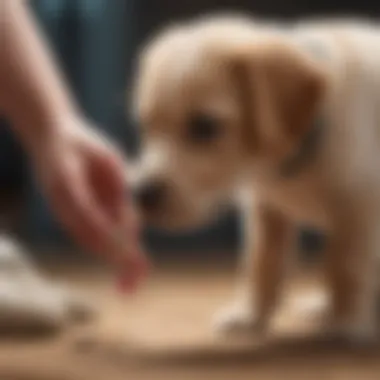Managing Loose Stool in New Puppies: Insights for Owners


Intro
Bringing a new puppy into your home can be one of the most joy filled experiences, but it can come with some surprise challenges. One issue that often rattles new pet owners is loose stool. It may seem harmless or just a part of the adjustment period, but it’s essential to grasp the nuances of why this can occur. This article takes a deeper look at loose stools in new puppies, unpacking not only the common culprits behind the condition but also the various steps pet owners can take to ensure the health and comfort of their furry companions.
Common Causes of Loose Stool
Dietary Influences
Diet plays a hefty role in your puppy's digestive health. Switching to a new diet, introducing new treats, or feeding too much at once could lead to unexpected bowel movements. Puppies have sensitive stomachs, and even the tiniest change in their food could lead them to express their discomfort in liquid form.
Health Assessments
In some cases, loose stool could be a symptom of underlying health issues. Bacterial infections, parasites, or viruses can easily upset a puppy's gut. Routine visits to a veterinarian ensure that your new family member stays in tip-top shape and can help catch any potential health issues early.
Environmental Factors
Relocating can be stressful for any creature, including puppies. New environments come with new smells, sounds, and even potential allergens. Stress can knock loose a pup's bowels. Keeping their environment calm and familiar will aid in reducing any anxiety they may feel.
Monitoring Your Puppy
Observing your puppy's behavior and stool consistency is crucial. Noticing changes can provide insight into their health. Keep an eye out for any additional symptoms such as:
- Vomiting
- Lethargy
- Appetite changes
If loose stools persist for more than a day or two, or if accompanied by other concerning symptoms, it’s wise to consult your veterinarian.
When to Seek Veterinary Assistance
Don’t wait too long before reaching out for professional advice. If your puppy exhibits any concerning signs such as dehydration, blood in their stool, or extreme lethargy, it’s imperative to book an appointment without delay. Ensuring the well-being of your new pet should be your top priority.
"It’s better to be safe than sorry; getting ahead of potential health issues can save much heartache down the road."
Closure
In summary, understanding the reasons behind your new puppy's loose stool can be a valuable resource in ensuring their health. By keeping a close check on their diet, environmental changes, and general health, you will be in a strong position to intervene early if needed. Remember, the road to fostering a healthy companion starts with knowledge and proactive care.
Overview of Puppy Digestive Health
When it comes to our four-legged friends, understanding their digestive health is paramount. Puppies have unique digestive systems that are still maturing, which can lead to various health concerns. This section shines a light on puppy digestive health, providing insights that can help pet owners navigate the complexities of a young pup's gut health. Rather than brushing issues under the rug, grasping the fundamentals of how a puppy's digestion works can lead to earlier identification of potential problems like loose stool.
A puppy's digestive system comprises several critical components. These parts must work in harmony to ensure that nutrients are absorbed efficiently, promoting growth and overall well-being. There are specific factors at play when we discuss puppy digestive health, including their diet, hydration, and even their environment. Recognizing these factors can provide valuable insights into why a pup might be experiencing loose stool or other digestive issues and how to address them.
The Digestive System of Puppies
A puppy's digestive system begins with the mouth, where food is chewed and mixed with saliva – an important first step. From there, it travels down the esophagus to the stomach. Here, gastric acids and enzymes break down food, allowing for better nutrient absorption later on. What many do not realize is that puppies have a smaller stomach than adult dogs, meaning they require more frequent meals to meet their energy needs.
Once food passes through the stomach, it enters the small intestine, where the majority of digestion and nutrient absorption occurs. This is where the real magic happens. Enzymes from the pancreas and bile from the liver aid in breaking down proteins, fats, and carbohydrates. It’s a rather intricate process.
Finally, any undigested food moves to the large intestine, where water is reabsorbed and the waste is formed into stool. If this system is disrupted in any way—whether by diet, parasites, or environmental changes—the result can often be loose stools.
Common Digestive Issues in Puppies
While loose stool is quite common among puppies, it’s far from the only digestive issue that owners might encounter. Some of the most prevalent issues include:
- Diarrhea: Often resulting from dietary changes, stress, or infections, diarrhea can appear suddenly and may be accompanied by other symptoms like lethargy or vomiting.
- Constipation: This occurs less frequently in puppies but can still be a concern. It typically presents as infrequent or difficult bowel movements.
- Gas and Bloating: Overeating or eating too quickly can cause discomfort and the buildup of gas.
- Vomiting: Various reasons can trigger vomiting in puppies, like food intolerances or even eating something they shouldn't.
Each of these conditions might require a different approach for management and treatment. Understanding your puppy's normal digestive patterns is essential; any significant changes can point towards underlying health issues.
Monitoring your puppy's digestive health is not just about addressing symptoms; it’s about fostering good habits and recognizing what is typical for your individual pet.
By paying close attention to these elements, pet owners can set the stage for a healthy, happy pup.
Defining Loose Stool
When welcoming a new puppy into the household, observing their digestive health becomes paramount. One issue that can arise is loose stool, which can be a source of concern for many new pet owners. Understanding what constitutes loose stool and assessing its severity allows for timely interventions, ensuring the well-being of these curious little creatures.
What Constitutes Loose Stool
Loose stool in puppies often refers to stool that lacks the firm consistency typically expected from healthy dogs. While a slight variation from the norm may occur in puppies as they adapt to new foods or environments, loose stool can signal underlying issues that require attention.
Defining loose stool involves considering several characteristics, such as:
- Consistency: Normal stool is generally well-formed and solid. Loose stool might resemble soft, mushy, or watery feces, which may not hold shape when placed on the ground.
- Frequency: Puppies experiencing loose stool may defecate more often than usual. Monitoring this frequency can give insight into digestive distress.
- Appearance: The color and texture of the stool may change noticeably. Healthy stool tends to be brown and moist but not wet.
- Odor: A bad smell often accompanies loose stool, which could indicate digestive upset.


Recognizing these attributes can help pet owners differentiate between normal fluctuations and potential health issues.
Identifying the Severity of the Condition
Assessing the severity of a puppy's loose stool is crucial for determining appropriate steps. Several factors can help gauge how serious the situation may be:
- Duration: If loose stool persists for more than 24 hours, it's wise to pay closer attention. Prolonged loose stools could lead to dehydration or other complications.
- Accompanying Symptoms: Look out for other signs like vomiting, lethargy, or decreased appetite. These could indicate a more serious underlying condition, warranting immediate vet attention.
- Puppy’s Behavior: Changes in a puppy’s usual demeanor—such as increased irritability or withdrawal from play—may signify discomfort or illness.
- Hydration Levels: Watch for signs of dehydration, such as dry gums or excessive thirst. This can be particularly concerning for young puppies who are quickly affected.
In such situations, it’s always best to err on the side of caution. If the loose stool is persistent or severe, reaching out to a veterinarian can provide guidance for the next steps.
"Recognizing the signs early can make a world of difference in ensuring your puppy’s health."
Conclusively, defining loose stool with precision and identifying its severity can empower puppy owners to take proactive measures in addressing potential health issues. Always keep a keen eye on your puppy’s tummy troubles; after all, a little bit of vigilance goes a long way in fostering their overall wellness.
Causes of Loose Stool in New Puppies
Understanding the causes behind loose stool in newly acquired puppies is essential for pet owners. This knowledge can help in promptly identifying the root cause, aiding in early intervention, and hence improving the pup's wellbeing. Loose stool can be a symptom of various underlying issues that range from harmless dietary adjustments to more severe health concerns. Being informed allows owners to make educated decisions on dietary changes, monitor their puppies' health more effectively, and seek veterinary assistance when needed.
Dietary Changes and Their Effects
Diet plays a pivotal role in a puppy's digestive health. Puppies are often introduced to new foods after adoption, which can eventually lead to their stools becoming loose. Here are some key points to consider:
- Gradual Transition: Transitioning from one food to another should not happen overnight. Mixing the new food with the old over several days can ease this adjustment, allowing the puppy's digestive system to adapt to the new ingredients. A sudden change can confuse their delicate system.
- Quality of Ingredients: Low-quality dog food often contains fillers and artificial ingredients that can upset a puppy's stomach. Owners should opt for high-quality, easily digestible diets that are appropriate for puppies.
- Allergies: Just like humans, puppies can have allergies too. Specific proteins or grains in their diet might not suit them, causing gastrointestinal distress. Owners should keep an eye on their puppy's reactions to different foods and consult a vet if they suspect allergies.
Parasites and Infections
Parasites are more than just a nuisance; they can cause significant health issues. New puppies, especially those from shelters or less hygienic environments, are more prone to picking up worms or other parasites. Additionally, infections from bacteria or viruses can lead to loose stool. Some important details include:
- Common Parasites: Roundworms, hookworms, and Giardia are among the most common culprits. Puppies may show varying degrees of symptoms depending on the level of infection.
- Symptoms of Infection: Besides loose stools, puppies suffering from infections may also display lethargy, vomiting, or a lack of appetite. By monitoring these symptoms, owners can better assess their puppy’s condition.
- Regular Deworming: It’s advisable to keep up with a regular deworming schedule as recommended by a veterinarian to help prevent these issues from cropping up.
Stress and Environmental Changes
Puppies, like people, react to their environments. Stress can manifest in various ways, including changes in bowel habits. Several contributing factors include:
- New Surroundings: Moving to a new home, meeting unfamiliar faces, or even different scents can be overwhelming. These changes can lead to anxiety, resulting in loose stools.
- Routine Disruptions: Puppies thrive on routine. Any changes to their daily schedule, whether it’s feeding times or playtimes, can contribute to digestive upset.
- Social Stressors: Introduction to other pets or a chaotic household setting can also induce stress that might upset a puppy’s digestive system.
"Understanding the causes of loose stool in new puppies is crucial for maintaining their overall health. Knowledge is power, especially when it comes to your pet's wellbeing."
Being proactive and aware of these factors can help owners address the underlying causes of loose stool before they escalate into more significant issues. The idea is not to panic, but to carefully observe and act accordingly.
Recognizing Symptoms Linked to Loose Stool
Recognizing symptoms connected to loose stool in new puppies is not just about keeping an eye on how your puppy's digestive system is functioning. It lays the groundwork for good overall health and can prevent future complications. When you can identify abnormalities in your puppy's behavior or physical condition, it allows you to take swift action to address any underlying issues. Moreover, understanding what symptoms to look for can empower pet owners to have impactful conversations with veterinarians and ensure a prompt, effective treatment approach.
Behavioral Changes in a Puppy
Behavioral changes in a puppy can serve as early warning signs regarding their health status. A puppy that is usually sprightly and eager to play may start showing signs of lethargy, disinterest in toys, or reluctance to engage with family members. They may also exhibit anxiety or restlessness. Here are some behavioral cues to watch for:
- Lethargy: If your puppy snuggles in corners instead of bouncing around, consider that a red flag.
- Change in Appetite: A sudden drop in interest in kibble can hint at gastrointestinal discomfort.
- Excessive Whining or Barking: Vocalization might increase if your puppy feels unwell, as if trying to signal distress.
- Isolation: If your usually social pup prefers solitude, it is worth investigating.
These behavioral shifts can indicate that your puppy might be suffering discomfort due to loose stool or other underlying digestive issues. Hence, keeping a close watch can be invaluable for early intervention.
Physical Symptoms to Monitor
Physical symptoms associated with loose stools can be equally revealing. Monitoring your puppy's physical condition can provide insight into the state of their health. Here are the key physical signs:
- Frequent Bowel Movements: Notice if your puppy is needing to relieve themselves more often than usual.
- Changes in Stool Form: Besides looseness, observe the color and consistency as these can indicate specific issues like infection or diet imbalance.
- Dehydration Signs: Check for dry gums and lethargy; these could indicate that loose stools are affecting hydration.
- Abdominal Distension or Pain: If your puppy seems uncomfortable when their belly is gently pressed, they might be in some serious distress.
Remember: The earlier you notice these signs, the better chance your puppy has at a swift recovery.
Keeping tabs on your puppy’s behavioral and physical symptoms is key in understanding loose stool. If you see anything concerning, it’s a good idea to consider consulting with a veterinarian to keep your furry friend on the path to good health.
Initial Management Strategies
When a new puppy has loose stool, knowing how to handle the situation can make a world of difference. The initial management strategies are not just about addressing the immediate issue but also about laying down a foundation for long-term health and comfort. With the right approach, you can provide vital support that may help alleviate the problem and ensure your pup is on the right track.
Assessing the Diet
A puppy's diet is often at the heart of loose stool. Young dogs have sensitive digestive systems, and any changes to their food can lead to digestive upset. If you've recently introduced new treats, switched brands, or altered their mealtime routine, consider revisiting these decisions.
When evaluating a puppy's diet, keep the following points in mind:
- Quality of Ingredients: Look for high-quality protein sources and avoid fillers. Ingredients like corn and artificial preservatives may upset little tummies.
- Consistency: Puppies thrive on routine. Sudden changes in food can confuse their digestive systems. If a diet change is needed, introduce it gradually over 5-7 days.
- Specialized Puppy Food: Products like Royal Canin Puppy or Hill’s Science Diet Puppy provide tailored nutrition that might be easier on their bellies.
Hydration and Its Importance


Hydration is crucial for a puppy experiencing loose stool. Diarrhea can lead to dehydration, which is particularly concerning in young puppies.
Here’s why it’s essential:
- Fluid Maintenance: Loose stools lead to the loss of fluids and electrolytes. Ensuring your puppy stays hydrated helps prevent complications.
- Water Intake: Always provide fresh water. If your puppy is reluctant to drink, consider offering ice cubes or a small amount of low-sodium broth to entice them.
- Signs of Dehydration: Keep an eye out for symptoms like lethargy, dry gums, or decreased skin elasticity. If you notice these signs, it’s important to consult your vet.
Monitoring for Further Symptoms
Continuous observation can help you gauge whether the situation is improving or worsening. Monitoring is about more than just looking for loose stools; it’s a chance to watch for any other signs that might need attention.
Here are essential things to keep an eye on:
- Frequency of Stool: Note how often your puppy goes and whether the stool is getting back to normal consistency.
- Other Symptoms: Look out for vomiting, lethargy, or any unusual behavior. These can be signs that indicate something more serious at play.
- Behavior Changes: If your puppy seems more withdrawn or is less interested in play, this can be a red flag.
Action Point: Logging symptoms in a puppy health diary may provide invaluable information if you need to seek veterinary advice later.
Using these initial management strategies will offer a good starting point for helping your puppy through a challenging phase. It emphasizes the importance of attention to diet, hydration, and the ability to monitor symptoms effectively, ensuring that your new canine family member is on the path to recovery.
When to Seek Veterinary Assistance
When it comes to a new puppy’s health, timely intervention is critical. Loose stool can sometimes be a simple issue, but on other occasions, it can indicate a more serious underlying problem. Recognizing when to seek veterinary assistance not only informs responsible pet ownership but also ensures our furry friends receive the best possible care.
The importance of understanding when a puppy's loose stool requires professional evaluation cannot be overstated. A casual approach may lead to worsening conditions, ranging from dehydration to systemic infections. Early intervention often translates to better outcomes and can protect young pups from more severe health troubles. This section seeks to empower pet owners with the knowledge of specific signs and necessary diagnostics that merit veterinary visits.
Signs Indicating Serious Concern
A puppy's health can change on a dime. Loose stool may seem minor initially, yet certain signs should raise red flags indicating the need for professional help:
- Duration: If the loose stool persists beyond 24 hours, it’s time to call a vet. An ongoing problem could stem from infections or other substantial health issues.
- Accompanied Symptoms: Watch for fever, vomiting, lethargy, or signs of pain. These symptoms may suggest bacterial or viral infections that require diagnosis and treatment.
- Blood or Mucus: If there’s blood or mucus in the stool, avoid hesitating. Such findings are concerning and warrant immediate veterinary consultation.
- Dehydration: Loose stools can lead to dehydration in puppies. Signs of dehydration include dry gums, excessive panting, and a noticeable decrease in energy. These symptoms should prompt an immediate visit to the vet.
- Change in Appetite: If your puppy refuses food for more than 12 hours along with experiencing loose stools, a veterinary evaluation is crucial.
Monitoring these indicators provides pet owners the insight needed to act wisely. The sooner the puppy receives proper care, the better the chances of a smooth recovery.
Veterinary Diagnostics for Loose Stool
Veterinary diagnostics serve as the route to understanding the precise causes of a puppy’s loose stool. When pet owners bring their pups to the veterinarian, several diagnostic approaches may be employed:
- Physical Examination: A hands-on assessment will help identify any apparent issues. The veterinarian checks the weight, hydration levels, and overall demeanor of the puppy.
- Fecal Tests: One of the first steps in diagnosing digestive issues involves analyzing stool samples. This analysis can reveal the presence of parasites, bacteria, or other irregularities.
- Blood Tests: A blood panel can provide a broader picture of your puppy’s health, helping to identify infection or organ dysfunction.
- Imaging: In certain cases, radiographs or ultrasounds might be necessary to identify potential obstructions or internal abnormalities.
These veterinary diagnostics equip pet owners with a clearer understanding of the puppy’s health and guide treatment plans effectively. Gathering this information is essential not only for addressing any current issues but also for establishing a long-term health strategy for the puppy.
"A stitch in time saves nine," as the saying goes. Swift veterinary attention can make all the difference in ensuring that your puppy leads a healthy and happy life.
Veterinary Treatment Options
Veterinary treatment for loose stool in new puppies is not just a best practice; it's often essential to address underlying health issues. Loose stools can signal a range of issues—from simple dietary mishaps to more serious infections or parasitic infestations. Hence, consulting a veterinarian becomes imperative once you notice persistent symptoms. This section aims to clarify the treatment options available, ensuring both pet owners and caretakers can make informed decisions regarding their puppy's digestive health.
Medications for Digestive Health
When it comes to treating loose stool, veterinarians may prescribe various medications aimed at restoring your puppy's digestive balance. Here are some common medications that can be utilized:
- Probiotics: These are beneficial bacteria that help maintain the natural gut flora. A good blend can aid in digestion and may help solidify your puppy's stool.
- Antibiotics: In cases where an infection is suspected, antibiotics can be a crucial part of treatment. However, it should be noted that indiscriminate use can lead to further digestive problems or antibiotic resistance.
- Anti-parasitic medications: If the cause is parasitic, medications such as fenbendazole or pyrantel can target those pesky invaders effectively.
- Anti-inflammatory drugs: Inflammation in the intestines can also lead to loose stools. A vet may prescribe nonsteroidal anti-inflammatory drugs to alleviate discomfort and restore balance.
The vet will determine the dosage and duration based on the puppy's age, weight, and overall health. It's essential not to self-medicate, as inappropriate usage can complicate conditions further.
Nutritional Recommendations from Veterinarians
Diet plays a pivotal role in managing loose stool. A veterinarian will typically emphasize the significance of a well-balanced diet tailored for your puppy’s nutritional needs. Here’s what to keep in mind regarding dietary interventions:
- Start with a bland diet: Introducing a bland diet can be a good way to give your puppy's digestive system a break. Foods like boiled chicken (without skin) or white rice can help.
- Progress to specialized formulations: After a couple of days on bland food, your vet may suggest a transition to specially formulated puppy diets rich in digestible ingredients. Brands that contain prebiotics can promote gut health.
- Incorporate dietary fiber: Fiber helps to regulate stool consistency. If feasible, raw pumpkin can be a nutritious choice to help firm up loose stools.
- Avoid abrupt dietary changes: It’s crucial to transition to new foods gradually. Sudden shifts can teeter the digestive system into chaos, exacerbating symptoms.
Veterinarians often stress the need to monitor your puppy’s reaction to food changes closely. Tracking what works and what doesn’t can be beneficial, particularly in identifying specific dietary intolerances.
"A tailored diet, coupled with appropriate medication, often leads to the fastest recovery for your puppy," veterinarians agree on this point, shining a light on the importance of these combined approaches in veterinary care.
Taking swift action and adhering to these clinical recommendations can set the stage for a healthier digestive system in your young canine companion. A proactive approach, including veterinary intervention and dietary adjustments, plays a crucial role in your puppy’s long-term health.
Long-Term Management of Digestive Health
Managing a puppy's digestive health isn't just a one-time gig. It's an ongoing process that sets the stage for a happy, healthy life. When we talk about long-term management of digestive health, we essentially refer to practices that can mitigate recurring issues like loose stool and reinforce your puppy's ability to digest food properly. A well-managed digestive system can make all the difference, ensuring that your puppy is absorbing the nutrients they need and staying comfortable in their day-to-day life. This is especially crucial for new puppies who are adjusting to new environments and diets.
Establishing a Balanced Diet
To ensure a puppy thrives, a balanced diet is key. The considerations when establishing this kind of diet include the right proportions of proteins, carbohydrates, and fats, as well as necessary vitamins and minerals. It's about knowing what fuels your puppy adequately while avoiding ingredients that could cause an upset stomach or loose stool.


Choosing High-Quality Puppy Food
Pick a high-quality puppy diet that meets the AAFCO standards to guarantee that it has all the crucial nutrients. Check ingredients – meat should be the first item listed, and grains should be whole and easily digestible. Brands like Royal Canin or Hill's Science Diet offer formulas designed specifically for puppies, ensuring growth and digestive health.
Transition Gradually
If you’re changing your puppy’s food, do so gradually to avoid digestive upheaval. Mix a little of the new food with the current one, increasing the new food's proportion over about a week. Sudden changes can send some puppies into a tailspin, resulting in gastrointestinal distress.
Monitor Food Reactions
Keep an eye on how your puppy reacts to different foods. Some dogs may have sensitivities or allergies to specific ingredients. If loose stool appears after introducing a new food, it might be time to play detective and perhaps eliminate that item from their diet altogether.
Routine Veterinary Checkups
Regular veterinary checkups are another cornerstone of long-term digestive health. It’s simple but often overlooked. Routine visits allow the vet to monitor your puppy's overall health and spot any potential issues before they become bigger problems.
Early Detection
During these visits, ailments like parasites or infections can be caught early on. Your vet can run tests and provide preventative care tailored to your puppy’s needs. If loose stool is persistent or recurrent, thorough evaluations help rule out serious underlying conditions.
Vaccinations and Preventative Care
Don’t forget vaccinations and preventative medications too. Keeping your puppy up-to-date on vaccines not only protects against common diseases but also keeps their immune system robust, thereby supporting digestive health.
Building a Relationship With Your Veterinarian
Building a rapport with your veterinarian is invaluable. It helps in understanding what’s normal for your puppy and their digestive patterns. This knowledge proves critical in making what’s often a complicated puzzle—their diet and health—much easier to solve.
Regular vet checkups are your first line of defense against persistent digestive issues.
By taking care of these aspects—diet and vet visits—you’re paving the road toward wellness. A solid foundation in the early stages can prevent a myriad of problems down the line, ultimately ensuring that your furry friend leads a life full of tail wags and puppy joy.
Preventive Measures for Healthier Puppies
Preventive measures in caring for new puppies are vital for ensuring their health and well-being right from the start. Loose stool can be a common issue faced by new pet owners, and understanding how to prevent it can save a lot of headache later on. Implementing effective preventive strategies will contribute significantly to a puppy's digestive health and overall happiness.
One of the primary components of a robust preventive healthcare plan is a consistent feeding schedule. Feeding puppies at regular times helps regulate their digestive system, allowing them to anticipate meals and process their food effectively. Unpredictability in mealtimes can lead to overeating or anxiety-induced digestion issues. Regular feeding times provide a sense of security for the puppy as they learn the routine of their new home.
Establishing a Consistent Feeding Schedule
Creating a predictable feeding agenda for your puppy offers multiple advantages:
- Body Clock Training: Just like humans, puppies adapt their bodily functions according to routines. A consistent feeding time helps their digestive system align with their eating habits, making their bathroom habits more predictable.
- Reduced Risk of Overeating: When puppies know when to expect food, they're less likely to hoover it down and gorge themselves, which can lead to digestive problems.
- Monitoring Food Intake: Keeping track of what and when your puppy eats can help you identify any irregularities in their digestion or changes in stool consistency promptly.
To set this up, aim to feed your puppy the same amount of high-quality puppy food two to three times a day. Measure the food and eliminate distractions during feeding time, creating a calm atmosphere. This consistency not only reinforces healthy eating patterns but also eases any anxiety your little friend may feel in this transitional period.
Creating a Stress-Free Environment
Beyond just feeding routines, a stress-free environment plays a crucial role in maintaining a puppy's digestive health. Stress can impact a puppy in myriad ways, often manifesting as loose stool or other gastric disturbances.
- Safe Space: Ensure your puppy has a designated area in your home that is calm and quiet, away from any chaos. Dogs thrive on routine and predictability. A space where they feel safe limits their anxiety and fosters better digestion.
- Socialization: While it’s great to expose your puppy to various people and pets, it’s a good idea to do it gradually. Overwhelming them with too much too soon can cause stress. Take it slow, allowing your puppy to adjust to new experiences at their own pace.
- Regular Play and Exercise: Physical activity is essential to a puppy's health, and it can help mitigate stress. Engaging in short bursts of playtime helps release pent-up energy, leading to a more relaxed puppy who digests better.
In summary, establishing a consistent feeding schedule and creating a stress-free environment are both essential preventive measures in ensuring a healthier lifestyle for puppies. Taking these steps can significantly reduce the occurrence of loose stools, offering a happier time as they adapt to their new homes.
"A consistent routine equals a carefree puppy. "
By focusing on these preventative strategies, you empower your puppy to develop healthy habits that will last a lifetime.
Ending: Ensuring Puppy Wellness
In any discussion surrounding the health of new puppies, the conclusion plays a vital role in summarizing the insights gathered throughout the article. Ensuring puppy wellness isn’t just about addressing immediate concerns like loose stool; it's also about fostering long-term health practices. Puppies are impressionable beings, and how we manage their developmental phases can significantly influence their overall health trajectory.
The complexities of puppy health necessitate a holistic view. Pet owners must recognize that each puppy is unique and deserves personalized attention. By comprehending the wide array of factors — from diet to environment and emotional wellbeing — owners are better equipped to nurture their new companions. Knowing when to seek veterinary advice is equally important, as many underlying causes of digestive issues can be identified and treated only through professional insight.
"Taking proactive steps in the early stages of a puppy's life can prevent bigger health problems down the line."
The importance of this conclusion is not solely in what was discussed, but in the approach that combines practical, day-to-day care with a vigilant eye watchful for any signs of distress. This integration fosters a nurturing environment that can lead to happier puppies and, by extension, happier dog owners.
Recap of Key Points
- Understanding loose stool is crucial in maintaining a puppy’s health.
- Regular monitoring for any dietary changes or behavioral fluctuations can identify potential issues early.
- Proper hydration is essential, especially for puppies experiencing loose stools.
- Veterinary intervention is necessary when serious symptoms appear or persist beyond a reasonable timeframe.
- Establishing a balanced diet and consistent feeding schedule can prevent many digestive issues.
- Creating a stress-free environment contributes significantly to the puppy's overall health and emotional stability.
Fostering Healthy Habits from the Start
Fostering healthy habits starts with education. From the moment a new puppy joins a household, owners must be proactive. This involves knowing the right nutrition for their breed and age. Puppy foods should contain high-quality proteins, fats, and essential micronutrients suitable for growing bodies.
Just as important is purity in food choices. For instance, introducing new treats or switching brands gradually can minimize gastrointestinal distress and ease the transition.
Furthermore, establishing routines proves beneficial. Dogs are creatures of habit; predictable feeding times, regular bathroom breaks, and a consistent sleeping environment help create a sense of security. A structured schedule not only aids in digestion but also enhances the bond between the owner and the puppy.
Finally, introducing positive experiences with different environments and people can build a resilient mindset in a puppy. Socialization helps them manage stress and anxiety better, leading to improved overall health. In essence, embedding these practices into a puppy's daily life sets the stage for a happy and healthy future.







